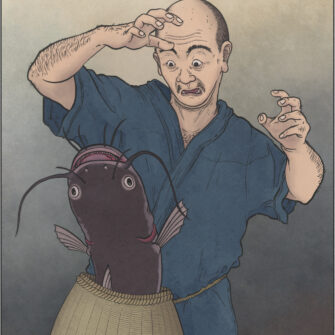
Otobō namazu
音坊鯰
おとぼうなまず
Translation: Otobō the catfish; the catfish of Otobō
Habitat: lakes and ponds
Diet: omnivorous
Appearance: Otobō namazu is a name found in several folktales about strange catfish. The particulars of each story vary from place to place, but they all share the common theme of a large catfish escaping capture by speaking the name “Otobō.”
Origin: Lakes and ponds were thought to be inhabited by gods–often a dragon, but also sometimes a giant snake, eel, or catfish. These gods sometimes interacted with the locals by providing rain when pleased, or causing floods, droughts, or earthquakes when displeased. They sometimes gobbled up people who fished too close to their homes, or demanded sacrifices in the form of young girls to marry. They sometimes blessed barren couples with children. And they sometimes played pranks on locals. Otobō namazu is a name shared by several of these gods.
In many stories, Otobō is a catfish who is the guardian of a small lake–although sometimes Otobō is the name of the lake or pond where it lives, and sometimes it is the name of a person who is assaulted by the catfish. Otobō is written with different characters from place to place, and it may be etymologically related to other guardian deities of water features, such as Otowa, Otaa, or even the princess of the ocean Otohime.
Legends: In Maebashi, Gunma, a fisherman was catching catfish in the Shimizu River. He trapped a large, splendid catfish so big that it barely fit in his hip basket. Suddenly a voice called out from the mountains, “Hey, Otobō! Hey, Otobō!” The catfish answered from the basket, shouting, “Hey!” The man was so scared he released the catfish back in the water and ran away.
In Okaya, Nagano, near Hanaoka where the Tenryū River flows out of Lake Suwa, there is a deep abyss in which a six foot long catfish lived. This catfish killed and ate any humans who got close. It was greatly feared by the locals. The god of Hanaoka, a dragon named Ryūhō, sent a strong man named Otobō to slay the great catfish. Otobō fearlessly dove into the abyss and wrestled the great fish. He strung a rope through its gills, then he dragged it from the water and hoisted over his shoulder to carry back to Ryūhō. As he climbed a slope, the catfish began to thrash about and shout, “Farewell Otobō! Farewell Otobō!” Then the rope snapped and the catfish dove back into the abyss. Ever since then the slope has been called Namazusaka (“catfish slope”).
Near the border of Susugaya and Miyagase, Kanagawa, where the forest is so thick that it is dark even in the daytime, there is a deep pool called Otobō ga fuchi (“Otobō abyss”). Long ago, an old charcoal burner was carrying a heavy load when he passed by Otobō ga fuchi. He looked down into the water and saw the biggest catfish he had ever laid eyes on. It was so magnificent that he decided to catch it alive. The old man climbed down into the frigid water and waited patiently. Finally he was able to grab it. It was over four feet long. He dragged the catfish out of the water, emptied his sack of charcoal, and put the catfish in it. Thrilled with his catch, he started home. But no sooner had he set off than a voice boomed from the mountains: “Otobō! Otobō! Someone is carrying Tengōbō away!” The old man was paralyzed with fright, but he managed to drop the catfish back into the water, and then he ran away as fast as he could.